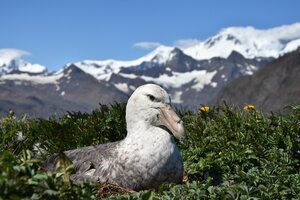~ecology-news-biolog | Bookmarks (484)
-
Antarctica's receding sea ice could impact seabirds' food supply
Antarctica's rapidly receding sea ice could have a negative impact on the food supply of seabirds...
-
From Mount Etna to the UK: Genetics unveil the Oxford ragwort unique journey and resilience
A descendant of Sicilian progenitors, this daisy-family plant appeared in the UK, escaped from a botanical...
-
Parasitoid wasp that lays its eggs inside of adult fruit fly discovered
A small team of biologists at Mississippi State University and the University of Wyoming has found...
-
Genomic analysis confirms the uniqueness of Iberian red deer in Europe
A genome study of more than 700 European red deer has identified four distribution areas on...
-
Modeling study explains why amazon is such a biodiverse paradise
The Amazon rainforest is home to a remarkable variety of plants and animals not found anywhere...
-
Bee antidote to deadly pesticides shows promise
Scientists may have found an antidote to pesticides that are directly and indirectly killing bees, according...
-
Swimming crustacean eats unlikely food source in the deep ocean
What do deep-sea crustaceans munch on? A new study titled "A deep-sea isopod that consumes Sargassum...
-
Cleaner wrasse check their body size in mirror before deciding whether to fight, research demonstrates
An Osaka Metropolitan University-led team has demonstrated that bluestreak cleaner wrasse (Labroides dimidiatus) check their body...
-
Thanks to humans, Salish Sea waters are too noisy for resident orcas to hunt successfully
The Salish Sea—the inland coastal waters of Washington and British Columbia—is home to two unique populations...
-
Study identifies areas of Europe at risk from dengue fever due to spread of Asian tiger mosquito
As Europe grapples with the growing threat of tropical diseases brought by the Asian tiger mosquito,...
-
Managing aquatic plants: Why doing nothing is also an option
Aquatic plants in lakes and rivers are important refuges for animals, bring oxygen into the water...
-
Jellyfish under attack: Study uncovers parasitic spillover of a burrowing sea anemone
Many marine organisms, like sea anemones, struggle to spread across the ocean, especially if they lack...
-
Investigators identify predators threatening Madagascar's iconic primates
In 2003, a team of primatologists led by the University of Colorado Boulder trapped, tagged and...
-
Researchers find live fungi, bacteria and viruses high in the Earth's atmosphere
A team of climate, health and atmospheric specialists in Spain and Japan has found abundant live...
-
Genetic analysis reveals new giant fanged frog species in Philippines that is nearly identical to even larger species
Researchers from the University of Kansas have published findings in the journal Ichthyology & Herpetology describing...
-
Cattle grazing by Maasai not harmful to national park, research argues
Bilal Butt knows how it sounds. The associate professor of sustainability and development at the University...
-
Pesticides in combination can have unexpected effects on the development of honeybees
Honeybees are social insects. Their colony only survives as a community, and healthy new generations are...
-
Digitally cataloging archived plant specimens can transform conservation efforts
Digitally cataloging the more than 300 million plant specimens preserved in museums worldwide could yield crucial...
-
Video evidence: Japanese eels escape from their predator's stomach
Many prey species have defensive tactics to escape being eaten by their would-be predators. But a...
-
Sharks are abandoning stressed coral reefs in warming oceans, study finds
Gray reef sharks are having to abandon the coral reefs they call home in the face...
-
Study fills in gaps and biases in plant biodiversity data
It is hard to protect something if you don't know where it is. Yet many people...
-
Uncovering microplastic dynamics and patterns in coastal habitats
Microplastics have raised concerns among scientists and the public in recent years due to their widespread...
-
Protecting just 0.7% of world's land could help save a third of unique and endangered species
Conservation efforts directed towards just 0.7% of the world's land mass could help protect one third...
-
Researchers propose mechanistic framework to explain complex microbe-host symbioses
Virtually all multicellular organisms on Earth live in symbiotic associations with very large and complex microbial...



























